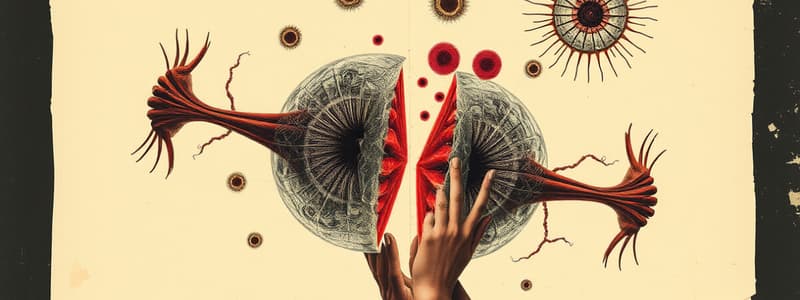Podcast
Questions and Answers
What is the definition of a somatic cell?
What is the definition of a somatic cell?
A somatic cell is any type of cell in the body other than cells involved in reproduction.
Are somatic cells haploid or diploid?
Are somatic cells haploid or diploid?
Diploid
Where are somatic cells found?
Where are somatic cells found?
Found in various tissues in the body.
What do somatic cells divide by?
What do somatic cells divide by?
What do somatic cells form?
What do somatic cells form?
What does the term diploid mean?
What does the term diploid mean?
Describe the two chromosomes in a pair.
Describe the two chromosomes in a pair.
When do somatic cells divide?
When do somatic cells divide?
Describe the process of mitosis.
Describe the process of mitosis.
Flashcards are hidden until you start studying
Study Notes
Somatic Cells Overview
- Somatic cells are non-reproductive cells found throughout the body, excluding gametes.
- They are diploid, possessing two of each chromosome type, totaling 46 chromosomes (23 homologous pairs).
- Somatic cells are located in various tissues and organs, playing essential roles in bodily functions.
Division and Differentiation
- Somatic cells divide through mitosis, a process that allows for growth and tissue repair.
- During mitosis, DNA replicates, increasing the quantity of genetic material before nuclear division occurs.
- This ensures that each daughter cell receives an identical set of 46 chromosomes, maintaining the diploid chromosome number.
Chromosome Structure
- Each pair of chromosomes contains the same genes in the same positions but may differ in alleles, contributing to genetic diversity.
- Somatic cells, except for reproductive cells, are derived from stem cells.
Growth and Repair
- Somatic cells actively divide during periods of growth and repair, adapting to the body's needs.
- They differentiate to form various types of body tissue, each performing specific functions necessary for overall health.
Studying That Suits You
Use AI to generate personalized quizzes and flashcards to suit your learning preferences.




